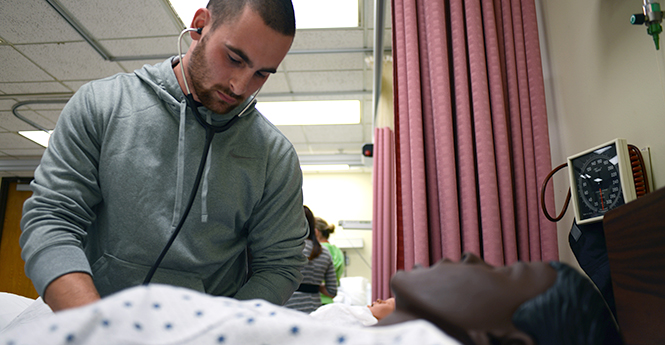Male nurses break old stereotypes
November 12, 2013
Nursing is moving away from the stereotype that nursing is a woman’s field.
This year at all Kent State campuses, the college enrolled 2,342 undergraduate nursing majors. Males account for 403 of those students, or 15 percent of the program — that’s an 8 percent increase from 2000.
Ed Herzog, lecturer in the College of Nursing for the last nine years, said he has seen a steady increase in the number of male nurses in the healthcare field since he became a part of it 38 years ago. He said he believes the recent increase in the number of nurses, especially male nurses, is related to the 2010 economic recession.
“People have been concerned with choosing a vocation with job security, and the health care field provides that,” he said.
Senior nursing major Stuart Ramsell said this desire helped him make the decision to become a nurse. He originally planned on majoring in English but switched to nursing at the end of his senior year of high school, he said.
“I felt very anxious about what I would do after college, and I wanted a degree where I would have a better idea of exactly what I’d do after graduation,” Ramsell said. “I really liked the healthcare field, and I learned how much flexibility the career of nursing could provide.”
In addition to job security, Ramsell said he also enjoyed the opportunity to work with and take care of people.
“I loved how much patient interaction I could have,” he said.
The aspect of caring for others is another reason some men choose to enter the nursing field. That was why Harry Moffet, a registered nurse in the Coronary Care Unit at Akron City Hospital, decided to join the field.
Moffet went to the University of Akron and graduated in 1979 with his Bachelor of Science in nursing. He has been working at Akron City Hospital since 1981 and has been with the Coronary Care Unit since 1987.
“I worked at Akron General as an orderly, and I liked doing that, so I just went into nursing school,” he said.
Tim Lewis, a senior nursing major who transferred to Kent State after spending one year at the University at Buffalo, said he decided to go into the healthcare field when he was in high school.
“I’ve always loved helping people, and I’ve always been a biology nerd,” he said. Lewis majored in pre-med with a concentration in nuclear medicine at Buffalo but decided that wasn’t the right fit. He wanted to work with patients more closely than doctors do.
“I want to treat the people, not treat the disease,” he said.
The stereotype of nursing as a women-only field has persisted throughout the years.
Herzog said it labels men as doctors and women as nurses, and any man who becomes a nurse is often thought to have aimed to become a doctor and “settled” on nursing if they couldn’t make it in a pre-med program.
Herzog said many times throughout his career, he has met people who have assumed he is a doctor because he is male.
Timothy Meyers, associate lecturer in the College of Nursing, said even the textbooks can encourage this stereotype. He said the textbooks almost always use the pronoun “she” when referring to nurses and “he” when referring to doctors and patients.
Lewis said he has also experienced this kind of negative feedback about becoming a nurse rather than a doctor. When he was at the University of Buffalo, he said a fellow classmate told him he would be selling himself short by “only” being a nurse.
Lewis said that didn’t matter to him because nursing is his true calling.
“People don’t understand the role of a nurse,” he said. “They think because I’m a guy, I should be a doctor. But that just wasn’t right for me.”
Ramsell said his family and friends have never discouraged him from becoming a nurse, but a few patients have tried to steer him toward becoming a doctor.
“I have come across a few well-intended but misinformed patients in the hospital who thought I should discontinue my nursing pursuits and start preparing for med school,” he said.
Herzog said stereotypes have diminished as time has passed and people have become more accepting of gender equality in the workplace.
“Men don’t feel they’re doing something that’s not masculine, as they once did,” he said.
Herzog said as time goes on, he hopes to see more males break the stereotype and become nurses.
“We’ve been perceived as secondary in nursing,” he said. “As more men have entered the field, that’s been broken down. Now, men and women are more equal.”
Contact Emily Mills at [email protected].












